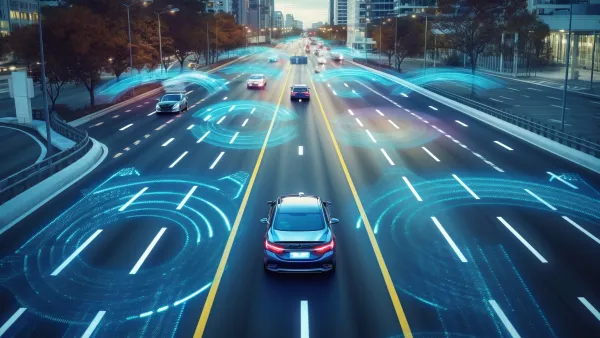Thanks to new technology embedded in the asphalt, the days of left-over meter minutes are gone in this southern CA beach city. Depending on whom you ask, parking is now managed more efficiently or the city is just making more money.
The new parking sensors went into effect on May 12. According to the city's parking webpage, "the sensors are part of the new credit card and phone-enabled parking meters installed over the past several months and represent the latest in parking meter technology."
Jennifer Medina describes the more controversial aspect of the meters.
More revenue or more turnover?
In 2009, consultants told the city that it "doesn't need more spaces; it needs to change how they are used, (that it needed) new pricing models to promote walking, biking or busing; freeing up prime spaces for short-term shoppers."
"City officials say the changes are devised to make street parking more efficient by turning over spaces more quickly. But critics, including residents and visitors from near and far, say the tactic appears to be simply a way to squeeze more money out of the parking meters."
However, the pattern has been the same as with the smart meters in San Francisco (See Planetizen: More Meter Revenue But Fewer Parking Tickets Issued). Donald Patterson, Santa Monica's assistant director of finance, reports that "since the new meters have been installed, parking tickets in the area have decreased." However, additional revenue of $1.7 million is expected from the meter fees.
Unlike the smart meters in San Francisco or Los Angeles that "relied on federal grants to begin making their changes, Santa Monica is paying a San Diego company, IPS Group about $4 million for the system, a much smaller price tag than the projects in the larger cities."
Hockey puck - wifi technology.
"The new systems generally rely on a monitor the size of a hockey puck embedded in the asphalt to detect when a car is in the spot. In Santa Monica, the moment a car exits, the meter, which is equipped with a wireless Internet connection to communicate with a central system, resets to zero....Over the next several months, the city will put each of its more than 6,000 meters on the same system."
The question is, do people really have a right to complain about losing a chance dividend they didn't pay for in the first place?
FULL STORY: Santa Monica Resets Its Parking Meter System

Analysis: Cybertruck Fatality Rate Far Exceeds That of Ford Pinto
The Tesla Cybertruck was recalled seven times last year.

National Parks Layoffs Will Cause Communities to Lose Billions
Thousands of essential park workers were laid off this week, just before the busy spring break season.

Retro-silient?: America’s First “Eco-burb,” The Woodlands Turns 50
A master-planned community north of Houston offers lessons on green infrastructure and resilient design, but falls short of its founder’s lofty affordability and walkability goals.

Test News Post 1
This is a summary

Analysis: Cybertruck Fatality Rate Far Exceeds That of Ford Pinto
The Tesla Cybertruck was recalled seven times last year.

Test News Headline 46
Test for the image on the front page.
Urban Design for Planners 1: Software Tools
This six-course series explores essential urban design concepts using open source software and equips planners with the tools they need to participate fully in the urban design process.
Planning for Universal Design
Learn the tools for implementing Universal Design in planning regulations.
EMC Planning Group, Inc.
Planetizen
Planetizen
Mpact (formerly Rail~Volution)
Great Falls Development Authority, Inc.
HUDs Office of Policy Development and Research
NYU Wagner Graduate School of Public Service




























